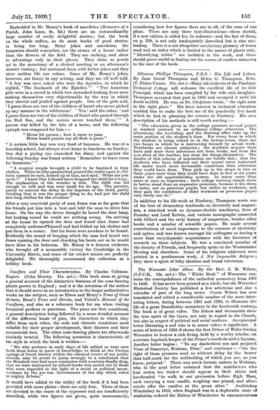Silvanus Phillips Thompson, F.R.S. : His Life and Letters.
Technical College will welcome the excellent life of its first
Principal, which has been compiled by his wife and daughter. Thompson accepted that post in 1885 and occupied it until his death in1916. He was, as Dr. Gladstone wrote, " the right man in the right place." His keen interest in technical education enabled him to make the best use of the practically free hand which he had in planning the courses at Finsbury. His own
description of his methods is still worth reading
" The education given in the college presents several points in marked contrast to an ordinary college education. The laboratory, the workshop, and the drawing office take up the main portion of the student's time. For every hour in which the student is being talked to in the lecture-room, there are two hours in which he is instructing himself by actual work. Textbooks are almost unknown ; the students acquire their facts and draw their inferences not from books, nor from the ipae dish of the teacher, but from the things themselves. The results of this scheme of instruction are briefly this ; that the students who have followed out their course enter industrial life under much more favourable conditions than otherwise they could have done. They pick up in the shops in two or three years more than they could have done in five or six years under the old 'apprenticeship system. In many cases they enter at once as improvers ; their college training stands them in better stead than an expensive premium, because it fits them to enter, not as premium pupils, but rather as workmen, and they gain the confidence of older workmen as premium pupils very rarely can do."
In addition to his life-work at Finsbury, Thompson wrote one
of the best of elementary textbooks on electricity and magnet- ism, a standard work on dynamo-electric machinery, lives of Faraday and Lord Kelvin, and various monographs connected with Gilbert and the early history of magnetism, besides other books and a number of scientific papers. He made several contributions of much importance to the sciences of electricity
and optics, and was known amongst his colleagues as having a more than encyclopaedic acquaintance with the literature of research on these subjects. He was a convinced member of the Society of Friends, and frequently spoke at the Westminster Meeting and elsewhere. Some of his religious addresses were printed in a posthumous work, A Not Impossible Religion ; they show a spirit of lofty idealism and broad toleration.


































 Previous page
Previous page